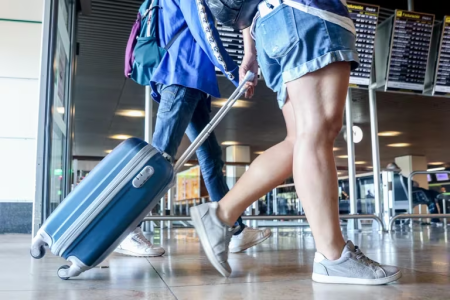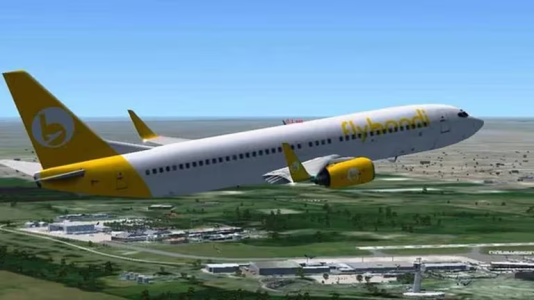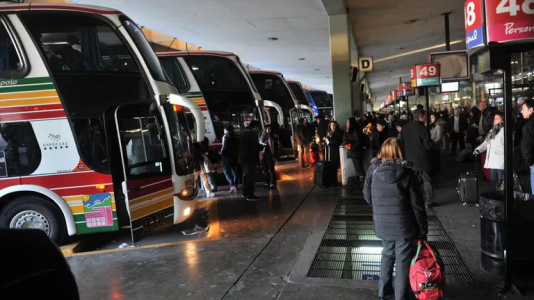The Government wants to remove obstacles for airlines and long-distance buses: what will change for passengers - Infobae

Source:

El Gobierno quiere quitar trabas para líneas aéreas y colectivos de larga distancia: qué cambiará para los pasajeros
La intención oficial es que las aerolíneas, siempre que estén en regla, puedan tomar rutas sin necesidad de autorización y alivianar la burocracia. Para los ómnibus buscarán que puedan operar las rutas que elijan las empresas sin restricciones
March 04, 2024
The intention is that airlines, as long as they are in compliance, can take routes without the need for authorization and alleviate bureaucracy. For buses, they will seek to allow them to operate the routes that the companies choose without restrictions

In its push for deregulation, the Government has its sights set on the airline sector and long-distance buses. Ricardo Rubio - Europa Press
The Government is advancing deregulation in different sectors of the economy. Two of those that are in the spotlight at this time are commercial airlines and long-distance buses . Although the measures to be taken are being studied by authorities from the National Transportation Secretariat together with experts from the private sector, and there is still no defined roadmap, the intention is clear: open the market so that companies provide the services they want with as few procedures and conditions as possible.
The premise is to end regulations that discourage the normal functioning of activity and investments. This is how Infobae let us know from sources aware of the conversations that are taking place at this time.
In the case of the airline sector, the intention is to advance in the elimination of public hearings so that airline companies can request routes as one of the main requirements. In recent years, only low-cost firms such as Fly Bondi or Jetsmart have entered the local market and the Government hopes that, through deregulation, others will be able to join.
Initially, progress will be made with the digitalization of some procedures. But the idea is that any company that meets legal and safety requirements can fly on the routes it prefers for its business. It is part of the official “open skies” policy .

The Government advances its open skies policy.
As Infobae learned from sources aware of the initiative, there were some contacts with lawyers, insurers, businessmen or other members of civil society to hear how the best conditions can be generated for the development of the activity. Although for now there are no measures that will be applied in the short term.
As of DNU 70/2023, President Javier Milei deregulated the aeronautical policy that he established and established that regular or non-regular air transport services will be carried out by companies authorized by the National Executive Branch. “The authorization to operate on a route does not mean exclusivity. The competent authorities will promote rules of healthy competition, in accordance with the principles of market freedom,” the regulation highlights.
“The National Executive Branch will regulate and carry out a civil aviation policy that allows its growth, under the principles of security and market freedom, in accordance with agreements with third states. Within the framework of domestic and international airline permits, the Argentine Republic will promote free reciprocal access to the airline markets and international and cabotage connectivity among national and foreign airline operators,” establishes another article of the DNU.

The Government seeks to ensure that long-distance bus companies can operate the routes they prefer, without restrictions.
Regarding long-distance buses , official offices recognize that the definitions are greener. However, the chosen direction is that registered companies can operate anywhere in the country where they want to do so and consider it good for their business.
The main complaint of the private sector is that State policy in recent years established regulations so that buses, which generally go between two capitals, must pass through cities with lower influx of passengers to guarantee “connectivity.”
This scheme requires reaching those towns regardless of whether it is low or high season. The question is what will happen to the people who live in those parts of the country where they could no longer have the possibility of traveling . The answer is usually that the market will itself organize transportation supply and demand, in this case, with the inclusion of smaller local companies that take those routes.
As always, labor legislation is seen by the Government as one of the main obstacles to the development of many activities. Long distance companies have to comply with a stricter collective agreement than many companies that provide shorter services but with fewer restrictions. Obviously, an indiscriminate opening can harm sectors that may be less competitive due to their costs. That is why the measures to be taken are still under analysis.

